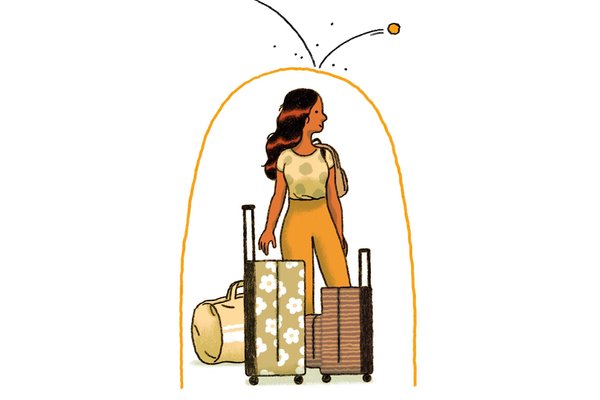More than 4.8 million American independent workers describe themselves as digital nomads: extended travelers who work remotely with the help of digital tools like a laptop or smartphone, according to a report by MBO partners, a work force management company.
“It was amazing to have the flexibility to build a temporary home anywhere in the world — as long as it had internet,” said Stephanie Lee, a writing consultant who backpacked through Asia for nine months in 2016, using apps like Slack and Google Translate to organize work and travel.
But whether you travel frequently or want to stay put in one country, the logistics of digital nomad-ing can be extraordinarily complicated. Yes, you’ll need to store your belongings and sell your car, but here are a few not-so-obvious to tasks to handle before you join their ranks.
Get your boss on board
If you don’t work remotely already, it might be something you can negotiate with an employer, if you have the kind of job that allows for it. Make the case for your professional value, similar to asking for a raise, then suggest that working from home can boost productivity, using evidence to support your case.
If they’re reluctant, suggest working from home once a week with the option to revisit full-time remote work later. “When that looks successful, gradually ramp up to two or three days per week and finally ask if you can just go fully remote,” Ms. Lee said.
Set up your remote office so that you have the tools you need: a Wi-Fi hotspot, a solid pair of earbuds with a mic, and a portable charger, to name a few. List your tasks and what you need to get each one done on the road. At the very least, you’ll probably need a meeting app like Zoom, a communication app like Slack, and a project management app like Trello. Establish your working hours when colleagues can get hold of you. Schedule time for exploring, too.
Get your documents in order
If you’re traveling abroad, make sure your passport is current. Most countries require it to be valid within six months of your last travel date. You might need a visa, but most countries don’t require one unless your stay is longer than 90 days. There are exceptions, though, so check the State Department’s website for information on each country. If you’re overseas living as an expat when you need to renew, you’ll have to visit a U.S. embassy in your destination country. The State Department has instructions for applying on its website.
If you’re bringing pets, they’ll need a vaccination and pet health certificate from your veterinarian, at the very least. Many countries have stricter guidelines, and the U.S. Department of Agriculture lists requirements for each country. Travel can be uncomfortable and dangerous for some pets, so talk to a veterinarian to ensure yours is prepared to fly, take road trips, or live in new environments.



Get a physical address
Digital nomads need a home base for mail, bills, banking and employer records. If you don’t plan on keeping your own place, this could be a parent or friend’s house. Some nomads rent a physical mailing address with services like Traveling Mailbox or Earth Class Mail, which also forward mail to your destination and send email snapshots. You can also temporarily forward mail with the U.S.P.S. Premium Forwarding Service. Alternatively, the U.S.P.S. allows you to put a hold on your mail for up to 30 days.
Set up online access for bank accounts and bills, sign up for paperless statements and ask employers to pay you digitally or via direct deposit. Research your bank’s A.T.M. network for taking out cash abroad, and ensure you’re using credit cards that don’t come with costly foreign transaction fees. Find this information on your bank or credit card company’s website, or just call them directly.
Pick a destination (and budget for it)
Calculate where you can afford to travel depending on your budget and time frame. (Apps like Destigogo and The Earth Awaits will do this for you). Once you know where you want to go, look for long-term lodging with tools like Airbnb, Hostelworld, and Innclusive (which was built for travelers who face racial discrimination). Check reviews with an eye for internet and Wi-Fi access, proximity to public work spaces, street noises and other distractions.
Budget for new expenses like public transportation, coffee shop visits and food — as a tourist, you’ll probably want to enjoy a few local restaurant meals. Some of your current expenses might offset these costs. You probably won’t need to pay utilities or fill your car with gas every week, for instance. If you won’t need your car, switch to a comprehensive-only policy that offers a basic level of protection. Ms. Lee switched her car insurance coverage to “storage mode,” which cost $50 for the year.
Get insured
You’ll need health insurance, too. “The easiest option for digital nomads is to maintain a home base somewhere in the States and keep an address where they’re registered to,” said Chad Rixse, a financial planner. “That way they can continue to use their personal health insurance, which often covers health care abroad to a certain extent.”
Check your policy to see what health issues are included abroad. Life-threatening emergencies are usually covered, but other incidents probably aren’t. Even if your standard insurance covers you in case of an emergency, you’ll probably have to pay out-of-pocket for follow-up care. Travel health insurance lasts a few weeks and costs a few hundred dollars. You could also sign up for international coverage with your current carrier, which will run you considerably more. There’s also expat insurance — providers like Aetna International and Cigna Global offer plans that cover you while you’re working abroad.

Hire a tax pro
Of course, there are tax consequences of working in one place and living in another. Some companies, usually those that want remote workers and digital nomads in their ranks, will handle the heavy lifting for you, but most leave you to sort it out.
In most countries, you can usually avoid paying taxes on your income by not spending more than six months there at a time, but rules vary in every country, Mr. Rixse said. “And state income taxes in the U.S. can be quite a bit trickier,” he added. There are also certain deductions you may be able to take as a digital nomad, like the home office you’re using abroad. Your best bet? Use the IRS Tax Preparer Directory to hire a professional to help out.
We have a new 52 Places traveler! Follow Sebastian Modak on Instagram, and discover more Travel coverage by following us on Twitter and Facebook. And if you sign up for our Travel Dispatch newsletter, each week you’ll receive tips on traveling smarter, stories on hot destinations and access to photos from all over the world.






